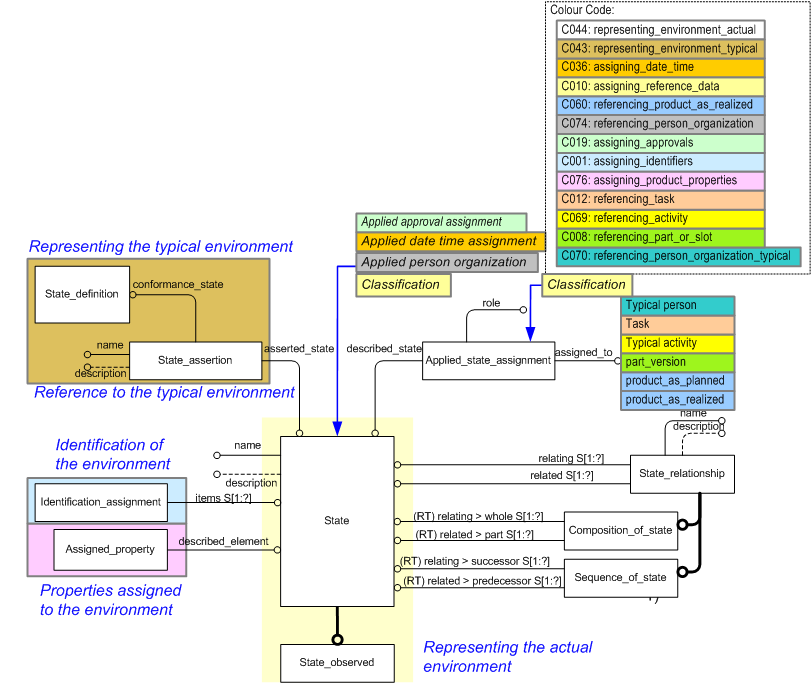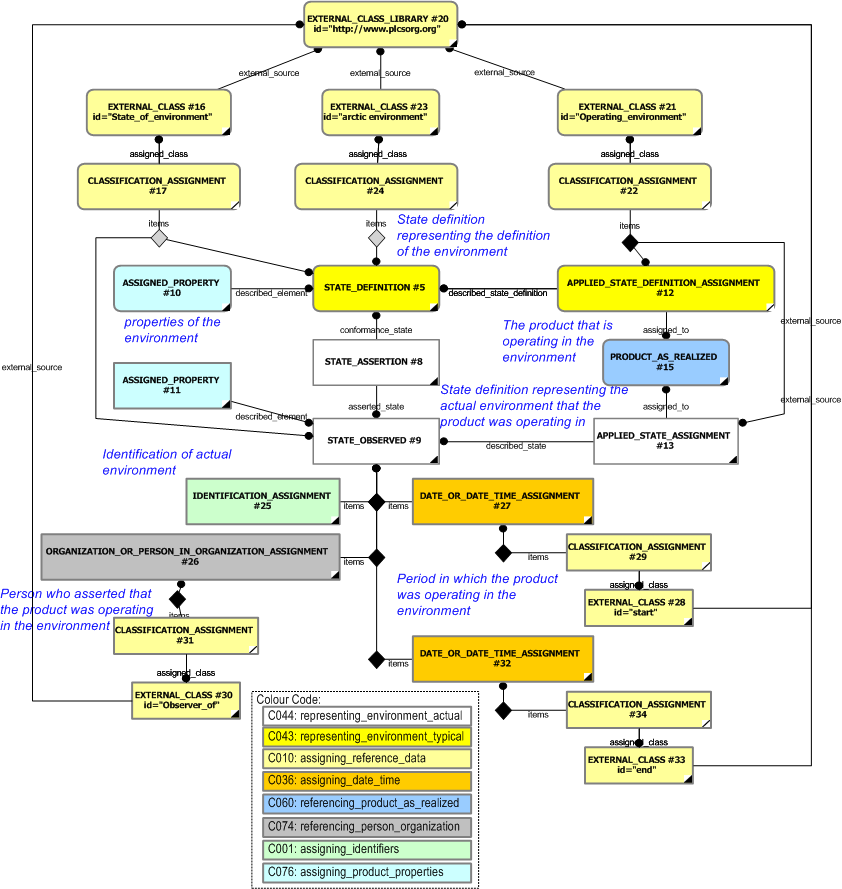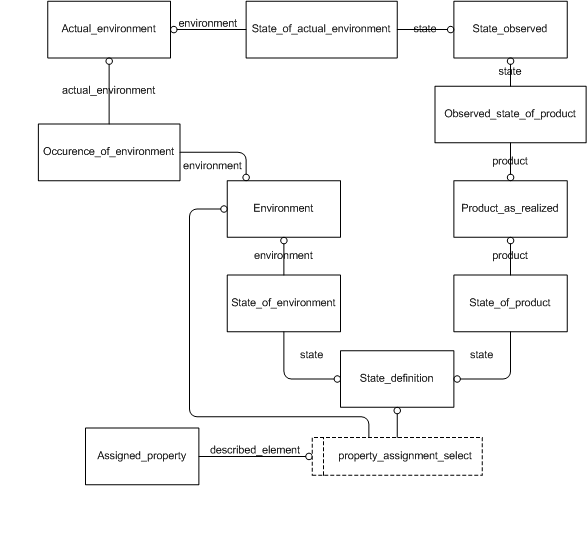
| Capability (C044):— representing_environment_actual | Date: 2007/07/11 16:32:00 Revision: 1.20 |
This capability describes how to represent a record of the environment over a given period.
The information required to represent the actual environment is summarized in the EXPRESS-G diagram in Figure 1 below and described in the following sections.
NOTE The EXPRESS-G is not complete. For the complete EXPRESS see the modules: State observed, State definition and State characterized.

An actual environment is represented using the
State_observed
entity
(see capability C041: representing_state_observed for details on
observed states) which is classified as
[State_of_environment]![]() Error RDL1: The class State_of_environment does not exist in RDL at URI urn:plcs:rdl:std. Check the dexlib/data/refdata/rdl_index.xml
Error RDL1: The class State_of_environment does not exist in RDL at URI urn:plcs:rdl:std. Check the dexlib/data/refdata/rdl_index.xml
.
The actual environment, State_observed is identified by using Identification_assignment to assign an identifier as described in C001: assigning_identifiers.
A set of properties are associated to the State_observed providing a record of the observed environmental characteristics such as temperature and humidity (see capability C076: assigning_product_properties for details on representing properties).
If the actual environment corresponds to a typical environment, then
State_assertion,
classified as
[State_of_environment]![]() Error RDL1: The class State_of_environment does not exist in RDL at URI urn:plcs:rdl:std. Check the dexlib/data/refdata/rdl_index.xml
Error RDL1: The class State_of_environment does not exist in RDL at URI urn:plcs:rdl:std. Check the dexlib/data/refdata/rdl_index.xml
,
relates the actual environment, represented by
State_observed
to the
State_definition
classified as
[State_of_environment]![]() Error RDL1: The class State_of_environment does not exist in RDL at URI urn:plcs:rdl:std. Check the dexlib/data/refdata/rdl_index.xml
Error RDL1: The class State_of_environment does not exist in RDL at URI urn:plcs:rdl:std. Check the dexlib/data/refdata/rdl_index.xml
,
representing the typical environment.
A record of the environment can be associated with a number of objects, such as people, tasks, activities, products indicating the actual environment that:
The Applied_state_assignment is used to associate the environment record, State_observed to the object. The precise meaning of the relationship is specified by reference data applied to the relationship using Classification_assignment. Reference data is described in the capability: C010: assigning_reference_data.
For example, the fact that a
Product_as_realized
has operated in an actual environment is represented by using the
Applied_state_assignment
relationship to relate the
State_observed
to the
Product_as_realized.
The
Applied_state_assignment
is classified as
[State_of_environment]![]() Error RDL1: The class State_of_environment does not exist in RDL at URI urn:plcs:rdl:std. Check the dexlib/data/refdata/rdl_index.xml
Error RDL1: The class State_of_environment does not exist in RDL at URI urn:plcs:rdl:std. Check the dexlib/data/refdata/rdl_index.xml
.
Assigning a Person or Organization
The person or organization that recorded the fact that the Product_as_realized was operating in an actual environment can be represented by assigning a Person_in_organization (using the relationship Organization_or_person_in_organization_assignment) to the actual environment (State_observed).
The Organization_or_person_in_organization_assignment is classified as "Observer of" (urn:plcs:rdl:std:Observer of).
NOTE The assignment of a person or organization is described in the capability C016: representing_person_organization.
The period during which the
Product_as_realized
operated in an actual environment is represented by the use of
Date_or_date_time_assignments
to assign a
Date_time
or
Calendar_date
to the actual environment
(State_observed).
There will be two instantiations of
Date_or_date_time_assignment
indicating the start of the period and the end of the period.
They will be classified as
[start]![]() Error RDL1: The class start does not exist in RDL at URI urn:plcs:rdl:std. Check the dexlib/data/refdata/rdl_index.xml
Error RDL1: The class start does not exist in RDL at URI urn:plcs:rdl:std. Check the dexlib/data/refdata/rdl_index.xml
and
[end]![]() Error RDL1: The class end does not exist in RDL at URI urn:plcs:rdl:std. Check the dexlib/data/refdata/rdl_index.xml
Error RDL1: The class end does not exist in RDL at URI urn:plcs:rdl:std. Check the dexlib/data/refdata/rdl_index.xml
respectively.
NOTE The assignment of dates is described the capability C036: assigning_date_time.
If documentation about the actual environment is required then
documents can be assigned to the actual environment
(State_observed)
using the
Document_assignment
relationship as described in capability
referencing_documents![]() Error C1: Capability referencing_documents not in dex_index.xml
Error C1: Capability referencing_documents not in dex_index.xml
.
An example showing how a State_observed and assigned properties are used to record an environment that a Product_as_realized has operated is shown in Figure 2.
NOTE The instance diagram is not complete.
The actual environment is represented by the instance State_observed (#9).

NOTE PLCS has not developed an explicit module for environment. If it had the EXPRESS to represent actual environment should be similar to the EXPRESS-G diagram shown in Figure 3, where an Actual Environment is defined by a series of observed states, or in simpler cases, by a set of properties. However, the environment module has not been developed in PLCS. Therefore State_observed will be used to represent the definition of an typical environment.

This capability "Representing an actual environment" is related to the following capabilities:
This capability "Representing an actual environment" is dependent on the following capabilities:
The following classes of reference data are required for this capability:
[State_of_environment]© OASIS 2010 — All rights reserved